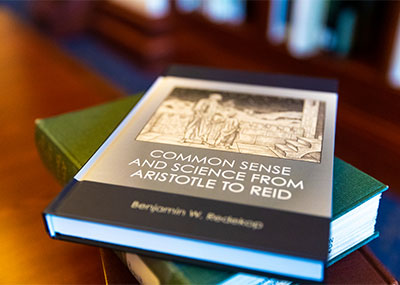
Above: Dr. Benjamin Redekop
Read time:

Twenty years after he first began his research, leadership professor Dr. Benjamin Redekop has published an examination of the relationship between common sense and scientific thinking from the ancient world to the present day.
Common Sense and Science from Aristotle to Reid chronicles the evolving relationship between “common sense,” both as a concept and mental faculty, and scientific inquiry.
Redekop began his research on the subject on a postdoctoral fellowship at Cambridge University. His academic pursuits led him to leadership studies, but he never stopped his initial research whenever he found the time.
He says the topic is relevant to leaders to understand how to help the population at large to embrace and understand science.
“Science education is crucially important for many reasons, not least because it helps to produce responsible, rational citizens who understand how reliable knowledge is produced and how not to be misled by charlatans and dictators,” Redekop said.
"Modern science and scientific method is one of the bases for a well-functioning democracy. Common sense will always be with us, and it behooves us all to understand it and how it is related to science and the scientific method, especially given how easy it is for them to grow apart."
Ancient and medieval science was based on common sense experience and understanding. The “New Science” of figures such as Bacon, Boyle, Galileo and Newton opened a rift between common sense and science which persisted – or, Redekop notes, perhaps even widened – to this very day. Philosophers then tried to mend this rift, and that tradition of thinking came into fruition in the Scottish school of common sense philosophy founded by Thomas Reid and others.
“The book charts this tradition of thought and places it into the context of current research in cognitive science and psychology, demonstrating that thinkers like Reid and others in the common sense philosophical tradition were actually on the right track about how the human mind makes sense of the world,” Redekop said.